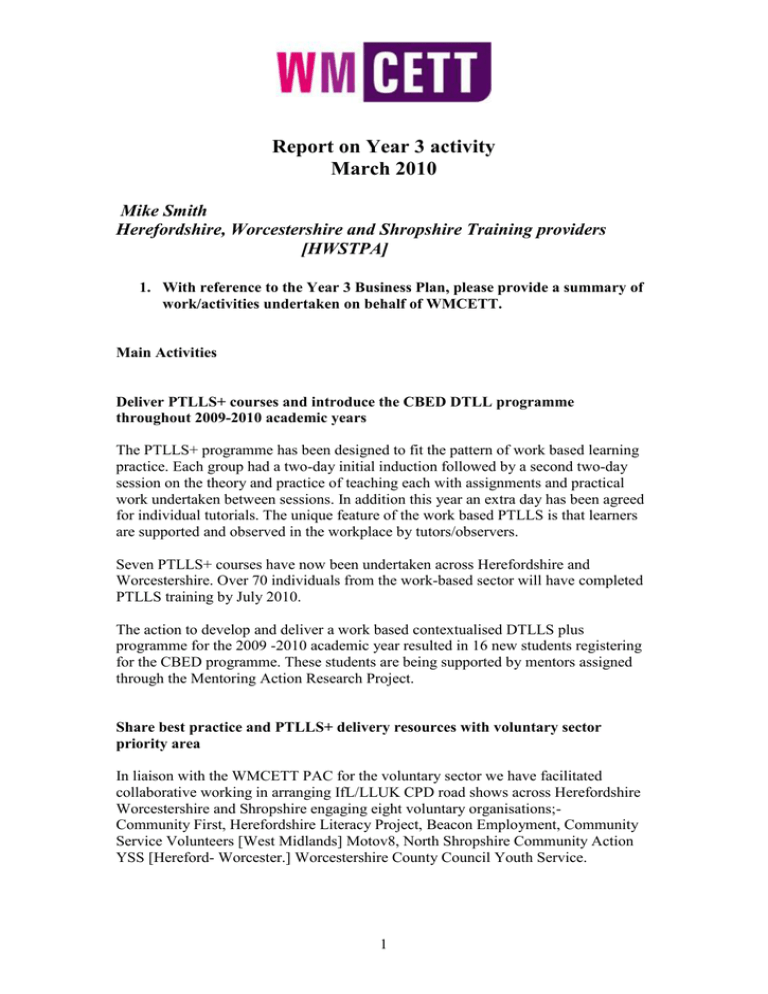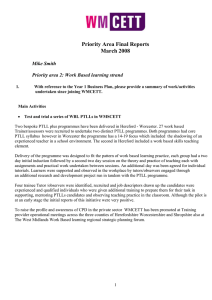Report on Year 3 activity March 2010 Mike Smith
advertisement

Report on Year 3 activity March 2010 Mike Smith Herefordshire, Worcestershire and Shropshire Training providers [HWSTPA] 1. With reference to the Year 3 Business Plan, please provide a summary of work/activities undertaken on behalf of WMCETT. Main Activities Deliver PTLLS+ courses and introduce the CBED DTLL programme throughout 2009-2010 academic years The PTLLS+ programme has been designed to fit the pattern of work based learning practice. Each group had a two-day initial induction followed by a second two-day session on the theory and practice of teaching each with assignments and practical work undertaken between sessions. In addition this year an extra day has been agreed for individual tutorials. The unique feature of the work based PTLLS is that learners are supported and observed in the workplace by tutors/observers. Seven PTLLS+ courses have now been undertaken across Herefordshire and Worcestershire. Over 70 individuals from the work-based sector will have completed PTLLS training by July 2010. The action to develop and deliver a work based contextualised DTLLS plus programme for the 2009 -2010 academic year resulted in 16 new students registering for the CBED programme. These students are being supported by mentors assigned through the Mentoring Action Research Project. Share best practice and PTLLS+ delivery resources with voluntary sector priority area In liaison with the WMCETT PAC for the voluntary sector we have facilitated collaborative working in arranging IfL/LLUK CPD road shows across Herefordshire Worcestershire and Shropshire engaging eight voluntary organisations;Community First, Herefordshire Literacy Project, Beacon Employment, Community Service Volunteers [West Midlands] Motov8, North Shropshire Community Action YSS [Hereford- Worcester.] Worcestershire County Council Youth Service. 1 Build capacity for the delivery of PTLLS/DTLLS courses though developing training providers’ existing CPD resources To assist work based training providers in meeting the ‘mentoring requirements’ embedded in the new teacher training programmes by developing a mentoring framework12 work based trainers have been recruited and trained to mentor students undertaking DTLLS courses A considerable amount of work was undertaken as an action research project to develop this theme which resulted in a framework with associated mentor handbooks. Promote and raise awareness of CPD in vocational/work-based teaching In conjunction with Anne Schofield IfL Connections Adviser we facilitated a three counties event entitled IfL - Reflect workshop The aim of the event was to assist teachers / trainers from the work-based learning sector to record their CPD (Continuing Professional Development) using REfLECT and work towards Professional Formation - gaining Q/ATLS (Qualified/Associate Teacher and Learning Skills) which was well attended and a great success with feedback from delegates ranging from very good to excellent. The success can be attributed to the road show content which the delegates found very relevant, the careful planning and input from CPD and sector agencies and the marketing of the event. A total of 38 teacher/trainer/tutors attended the event 2. Identify any activities listed above which have been particularly successful and explain why you think this occurred. Action Research project – Developing a Mentoring Framework The initiative intended to develop a support and guidance framework and human resource for new and developing teacher/trainers by establishing criteria for and recruitment of mentors. Their role will be to support individuals throughout their training programme, increasing success rates by identifying those at risk of ‘dropping out’ for whatever reason. Twelve senior practitioners from work-based learning came together to undertake ‘Gold Standard’ mentor training. The twelve, selected from a number of independent training providers across the Herefordshire and Worcestershire area, deliver workbased skills and skills for life WMCETT qualifications as part of apprenticeship and foundation level programmes. The newly appointed mentors are supporting candidates undertaking the work-based contextualised and blended DTLL [CBED] programme A three-day mentor course delivered by Jayne Hedges, WMCETT’s Mentoring Project Co-ordinator, delivered the mentor training which carried 10 Credits at NCF 4 or university level one 2 The success of this project is a direct result of engaging with work-based providers and allowing them to set the parameters and develop the detail of the mentoring framework contextualised to their particular method of teaching and training. 3. Identify any activities listed above which have been particularly difficult to undertake, or targets which have proven difficult to reach, and discuss why. The PTLLS plus programme has proved problematic in recruiting sufficient numbers for the planned two courses in Herefordshire and Worcestershire have not run. This is seen to be for two reasons 1] The number of colleges and private training providers who have developed and marketed their own PTLLS courses 2] The current economic climate which has resulted in uncertainty for staff recruitment and retention 3





